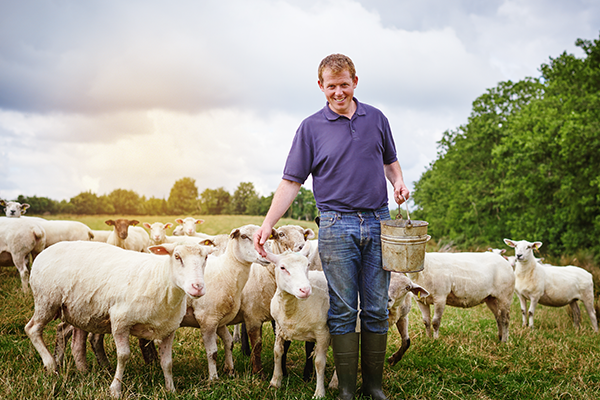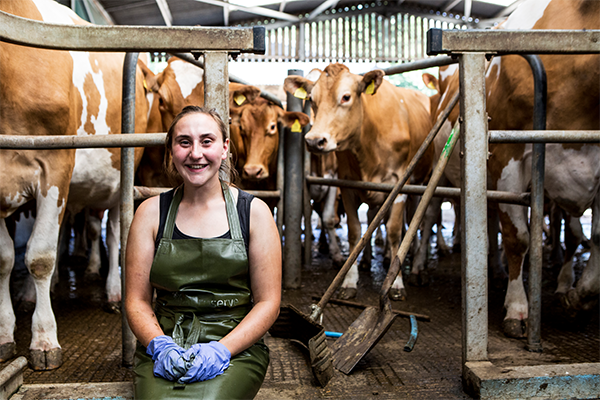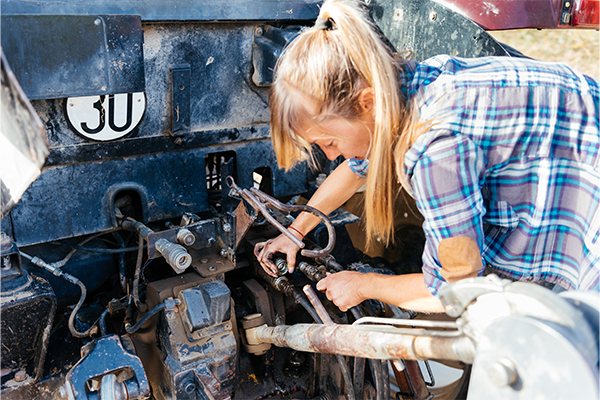If you enjoy working outdoors, you might be interested in becoming a farmer. A farmer is someone whose job it is to run and perform duties on a farm. Farmers grow plants and raise livestock and are responsible for the majority of the world’s food supply. There are a variety of farmers, specialising in different types of food production and agriculture. In this article, we will guide you through what a farmer does, types of farmers and how you can become a farmer.

What is a farmer?
A farmer is someone who owns or manages a farm. Usually a farmer is a self-employed person who works on their own land or leases property to cultivate crops and rear animals for food. Farmers are involved with day to day activities and farm management including tending to livestock, fixing fences and machinery, planting and harvesting crops and animal transportation.
What does a farmer do?
A farmer has a variety of jobs and responsibilities depending on the type of farming operation and its size. Here are some of the common duties of a farmer.
- Planting and managing crops: One of a farmer’s main jobs is to plant and manage crops. This involves loosening the soil, seeding, applying fertilisers, managing irrigation and relocating plants when they grow. To keep crops healthy and strong, farmers need to consider variables like soil nutrients, weed control and crop protection from weather damage.
- Harvesting crops: When the crops are ready to be harvested, farmers will use tools and machinery to pick and collect all or a portion of the plants. Duties during harvesting include deciding on the time to harvest, operating equipment for harvesting, storing and transporting the harvest.
- Managing livestock: Livestock management includes the care, breeding and overall well-being of livestock on a daily basis. Farmers must ensure livestock has ample water, food, shelter and cleanliness.
- Animal transportation: Some farmers may need to transport their animals from one location to the next. Due to the size and scale of livestock transportation, farmers need specific training to ensure optimal animal welfare and minimise any transport-related issues.
- Marketing and selling crops/livestock: Farmers are responsible for selling and marketing their crops and livestock. This could be direct to buyers or through distributors like grocery stores or wholesalers. To sell livestock, farmers have the option of saleyards, paddock sales, auctions and forward price contracts between the producer and the seller.
- Farmyard maintenance: Farmers must maintain the farmyard, including the fields, barns, fencing and gates. Jobs include mowing, weeding, applying pesticides, fixing fences, gates and farmyard infrastructure.
- Equipment operation and maintenance: Farm equipment includes tractors, planters, combines and irrigation systems. The equipment must be routinely serviced and maintained, repaired and have safety checks.
- Land management: Land management for a farm involves managing and protecting the land itself. Farmers need to assess how to best use the land, concentrate on livelihood, lifestyle and sustainability. To manage the land sustainably, farmers may need to implement practices like crop rotation and habitat restoration.
- Record keeping: Detailed record keeping is essential for farmers to keep track of their farming practices. These include livestock inventories, financial transactions, crop yields, planting and transportation records and compliance with regulations.
What is the workplace of a farmer like?
Most of the time, the workplace of a farmer is on a farm. Farms are usually in rural areas with wide open spaces that provide ample land to grow crops or raise livestock. However, some smaller scale farming may exist in urban areas, greenhouses or indoor farms. Often farmers work outside but they can work inside in an office doing paperwork or a barn looking after animals. A farm workplace outside could mean a variety of terrains from wide open fields mustering livestock, to working in crop plantations, woodlands, wetlands or mountains. For a small percentage of time, the workplace of a farmer may be at a farmers market or sale yard during the sales and marketing phase of the farming process.
Types of farmers

The farming industry is vast with farmers specialising in different produce and practices. The different types of farmers are:
- Livestock farmers: Livestock farmers breed and raise livestock like cattle, pigs, poultry, goats and sheep. They raise these animals for meat, eggs, wool, dairy and other products.
- Dairy farmers: Dairy farmers raise dairy cattle for milk production. The main duty of a dairy farmer is to oversee the milk production. Their role is to be responsible for the daily care of the dairy cows, including feeding, breeding and milking. Dairy farmers also process the milk and market dairy products like cheese and butter.
- Crop farmers: Crop farmers grow and harvest crops like grains, fibre, oil seeds, fruits and vegetables. They cultivate the crops to sell as food, fuel and fibre. Crop farmers are responsible for planning, organising and coordinating the farming operations for growing crops.
- Poultry farmers: Poultry farmers raise poultry like chickens, turkeys and ducks for eggs, meat and breeding stock. Poultry farmers manage the flocks including housing, feeding and healthcare. They can be large commercial poultry farms or small backyard coops.
- Aquaculture farmers: Aquaculture farmers breed and harvest fish and other aquatic organisms in controlled environments like tanks or substantial water facilities. It is basically farming in water. Aquaculture farmers plan, organise and control farming operations on fish and aquatic organisms to be sold for food or environmental purposes.
- Horticultural farmers: Horticultural farmers grow vegetables, fruits, flowers or herbs for personal or commercial use. A horticultural farm might be a vegetable farm, nursery, fruit orchard or even greenhouse.
- Hydroponic farmers: Hydroponic farmers grow plants using a water based solution instead of soil. Most hydroponic farms are vertical and grown indoors because they don't need soil. The vertical farms can be in greenhouses or indoor farms.
- Lifestyle farmers: Lifestyle farmers can grow crops or raise livestock but it is generally on a small scale farm. Lifestyle farmers usually run their farm as a hobby but it can generate profits. Some lifestyle farmers offer direct from farm sales to the public.
What skills do you need to be a farmer?

Farming skills refer to the talents, expertise and abilities that help you perform the duties of a farmer. The following skills will help you perform farming duties successfully:
- Organisational skills: Farmers need organisational skills to ensure the farm runs smoothly and is as productive as possible. This includes having a clear plan of duties for the day, weeks and months ahead, record keeping and the ability to organise staffing schedules.
- Time management skills: Farmers need to have good time management skills to ensure the farm operates efficiently. Time management includes prioritising tasks, delegating and outsourcing, and making sure to have a work-life balance.
- Mechanical repairing: Farmers need to have mechanical skills to repair or maintain farm machinery. Farm equipment needs regular maintenance to ensure it works efficiently, and being able to repair any faults means less money spent on professional mechanics.
- Problem solving: Farmers need to be problem solvers due to the unpredictability of farming. A farmer may need to find solutions to weather problems, issues with a crop or livestock and be able to make effective decisions to ensure continued productivity.
- Physical fitness: Farming is a physical job so a farmer needs to have good health and fitness. Most farmers spend the majority of their days standing, lifting, pulling, or hauling objects or machinery. Many farming jobs with livestock and agriculture involve tasks that require physical strength and stamina.
- Communication skills: Farmers need effective communication skills to deal with employees, suppliers, customers and stakeholders. With good communication, farmers can create and sustain productive relationships within the industry.
- Adaptability: Farmers need to have the ability to adapt to environmental situations as well as new technology and the changing needs of consumers. Farmers often face regulatory changes, droughts, and floods, so being flexible and adaptable to change is essential.
How to become a farmer
TAFE Gippsland provides numerous courses that are ideal for a career in farming. These courses provide you with practical skills to become a farmer.
- Certificate II in Agriculture will give you practical skills and knowledge about workplace safety on the farm, understanding animal health and welfare steps, and a basic understanding of farm machinery, such as tractors and their attachments.
- Certificate III in Agriculture is a chance to take your studies further. This gives you practical experience at a range of commercial farms throughout Gippsland. It gives you a chance to focus on what kind of farming interests you, be it dairy farming, crop farming or livestock.
- Certificate IV in Agriculture takes your potential to the next level, helping you become leaders in your field of choice. You will be taught on the job and begin to take responsibility for your work and for the work of others. Learn people management, work health and safety, supervision of animal programs, livestock development and understand soil and pasture nutrition and improvement.
- Certificate III in Dairy Production is perfect for the Gippsland region. A mix of simulated learning and on-site working with dairy farmers and their herds, you will gain valuable experience and learn vital skills to help you boom in the dairy industry.
- Diploma of Agriculture is designed to encourage people already working on the land to educate and upskill themselves. Ideal for farm managers to understand the totality of farming, including animal husbandry, crop life cycles, farm management and whole farm planning.
- Artificial Insemination of Livestock is a short course that will help you develop a successful artificial insemination program for your farm. An accredited course, it will teach you the skills needed to enhance your livestock’s performance and achieve fertility targets.
Becoming a farmer is a rewarding career and lifestyle choice, whether you specialise in agricultural products or livestock. In this article we have explained what a farmer does, the types of farmers and how to become a farmer. If you would like to pursue a career in farming, contact TAFE Gippsland for further information on farming courses.